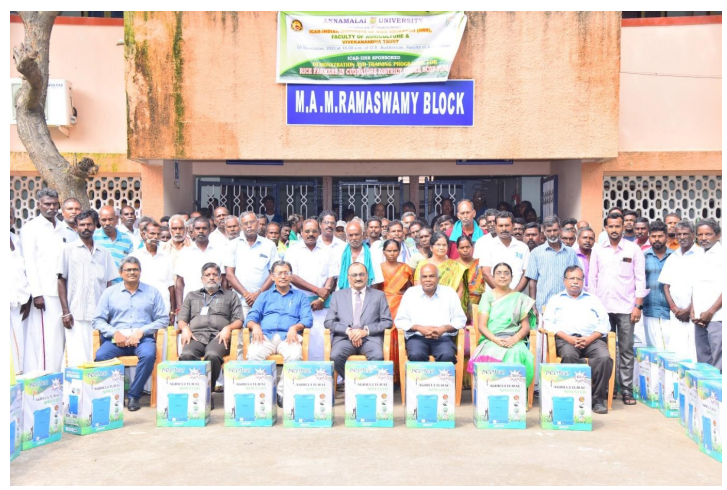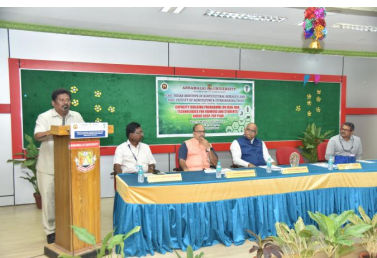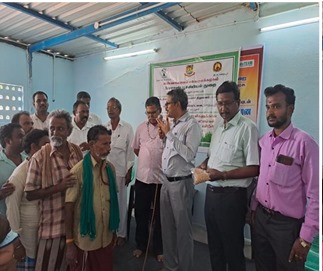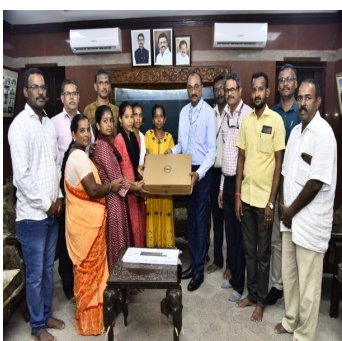Integrated Rural Development for Sustainable Livelihoods
Project Duration: January 2021 - December 2022
Project Objectives:
- To improve the overall quality of life for rural communities by addressing key development
challenges.
- To promote sustainable agricultural practices, access to clean water, healthcare, and education.
- To enhance local capacity through training and community participation.
- To reduce poverty and create economic opportunities in rural areas.
Project Strategies:
- Multi-Sectoral Approach: A comprehensive approach addressing agriculture,
healthcare, education, infrastructure, and community empowerment.
- Community Engagement: Extensive consultations to identify needs, with local
communities central to decision-making and implementation.
- Capacity Building: Training and skill development programs to empower community
members.
- Partnerships: Collaborations with local government, NGOs, and stakeholders to
leverage resources and expertise.
Project Activities:
Agricultural Development:
- Introduction of modern farming techniques.
- Distribution of improved seeds and agricultural equipment.
- Formation of farmers' cooperatives for collective marketing and resource-sharing.
Healthcare Improvement:
- Health education and awareness campaigns.
- Training of local healthcare workers.
Education Enhancement:
- Teacher training and capacity building.
- Scholarships for underprivileged students.
Infrastructure Development:
- Promotion of small-scale enterprises.
- Vocational training for income generation.
- Access to microfinance and credit facilities.
Project Outcomes:
- Improved Agricultural Productivity: Increased crop yields and food security;
enhanced income for farmers; reduced dependency on subsistence farming.
- Enhanced Healthcare Access: Reduced mortality rates; improved health awareness
and practices.
- Access to Quality Education: Increased enrolment rates; improved educational
outcomes.
- Sustainable Livelihoods: Diversified income sources; reduced poverty;
strengthened community cohesion and self-reliance.
Lessons Learned:
- Community Ownership: Empowering local communities in decision-making is crucial
for success.
- Sustainability: Long-term sustainability depends on building local capacity and
aligning interventions with community needs.
- Partnerships: Collaboration amplifies impact.
- Monitoring and Evaluation: Regular assessments are essential for progress and
adjustments.
Conclusion:
The Integrated Rural Development for Sustainable Livelihoods project has positively impacted rural
communities, enhancing their well-being, economic prospects, and self-sufficiency. By adopting a
holistic approach and involving local stakeholders, the project has set a foundation for enduring
development in the region.
Capacity Building Programme on ICAR–IIHR Technologies
Program Duration: February 2021 - March 2021
Program Location: Indian Institute of Horticultural Research (IIHR), Bangalore, India
Program Objectives:
- To disseminate cutting-edge agricultural technologies developed by ICAR–IIHR.
- To enhance the technical skills and knowledge of participants in horticultural practices.
- To promote sustainable and efficient horticultural production techniques.
- To facilitate networking and collaboration among agricultural professionals.
Program Content:
- Technical Workshops: Participants attended hands-on workshops on various
ICAR–IIHR technologies, including improved crop varieties, pest management strategies, and
post-harvest management.
- Field Visits: Field visits to ICAR–IIHR research farms and demonstration plots
allowed participants to observe the practical application of the technologies.
- Lectures and Seminars: Renowned horticultural scientists delivered lectures on
the latest research findings and advancements in the field.
- Group Discussions: Participants engaged in group discussions and case studies
to explore real-world challenges and solutions.
- Networking Sessions: Opportunities for networking and knowledge exchange were
facilitated through panel discussions and informal interactions.
Participants:
The program attracted a diverse group of participants, including:
- Agricultural extension officers
- Farmers and farm managers
- Horticulture students and researchers
- Representatives from government agencies
- Agribusiness professionals
Program Outcomes:
- Enhanced Technical Skills: Participants gained a deeper understanding of
ICAR–IIHR technologies and their practical applications in horticulture.
- Knowledge Transfer: The program facilitated the transfer of research-based
knowledge to participants, who could subsequently disseminate it to a wider audience.
- Improved Farm Practices: Farmers and farm managers incorporated ICAR–IIHR
technologies into their operations, leading to increased crop yields and reduced losses.
- Research Collaboration: Researchers and students established connections with
ICAR–IIHR scientists, paving the way for collaborative research projects.
- Policy Insights: Government representatives and agricultural officers obtained
valuable insights into policy implications and opportunities for technology adoption.
Participant Testimonials:
- Participant 1 (Agricultural Extension Officer): "The program was an eye-opener.
The practical knowledge and experiences gained will enable me to better assist farmers in
adopting these advanced technologies."
- Participant 2 (Farmer): "I never knew such advanced techniques were available.
Thanks to this program, my farm is now more productive, and my income has increased
significantly."
Conclusion:
The Capacity Building Programme on ICAR–IIHR Technologies was a resounding success in equipping
participants with the knowledge and skills needed to enhance horticultural practices and promote
sustainable agriculture. The program fostered collaboration and knowledge sharing among diverse
stakeholders and contributed to the adoption of innovative technologies in the agricultural sector.
Sponsored ICAR-IIRR Training cum Demonstration Programme for Rice Farmers in
Cuddalore District
Program Duration: April 2021 - March 2022
Program Location: Cuddalore District, Tamil Nadu, India
Program Objectives:
- To empower rice farmers, particularly from marginalized communities under the SCSP and TSP
special programs, with advanced agricultural knowledge and skills.
- To promote sustainable and innovative rice farming practices for enhanced crop yield and income.
- To reduce the knowledge gap and facilitate technology adoption among small and tribal farmers.
- To improve the overall socio-economic status of rice farming communities in Cuddalore District.
Program Activities:
- Training Workshops: A series of training workshops were conducted, focusing on
modern rice cultivation techniques, pest and disease management, water conservation, and
post-harvest management.
- On-field Demonstrations: Practical demonstrations were organized in
collaboration with local farmers, showcasing the implementation of advanced farming practices
such as System of Rice Intensification (SRI) and precision agriculture.
- Access to Resources: The program provided access to high-quality seeds,
fertilizers, and farm equipment at subsidized rates, ensuring that farmers had the necessary
resources to adopt new practices.
- Capacity Building: Participants were equipped with knowledge on sustainable
agricultural practices, financial literacy, and market linkages to improve their overall farming
operations.
- Interactive Sessions: Regular interactive sessions allowed farmers to share
their experiences, ask questions, and seek guidance from agricultural experts.
Participants:
The program primarily targeted rice farmers from Scheduled Caste and Tribal communities in Cuddalore
District, Tamil Nadu. Participants included:
- Smallholder farmers
- Tribal farmers
- Women farmers
- Agricultural extension workers
- Local agricultural cooperatives
Program Outcomes:
- Enhanced Agricultural Skills: Participants gained practical knowledge and
skills, enabling them to adopt modern rice farming techniques.
- Increased Crop Productivity: Adoption of advanced practices like SRI led to
increased rice yields and improved crop quality.
- Improved Livelihoods: Farmers reported higher incomes due to increased yields
and better market access.
- Community Empowerment: The program contributed to the economic empowerment of
marginalized communities and reduced their dependence on traditional farming methods.
- Knowledge Sharing: The interactive nature of the program fostered knowledge
sharing and community cohesion among participants.
Impact on SCSP and TSP:
The program successfully aligned with the objectives of the Scheduled Caste Sub-Plan (SCSP) and
Tribal Sub-Plan (TSP) by directly benefiting marginalized communities and improving their
socio-economic conditions.
Conclusion:
The Sponsored ICAR-IIRR Training cum Demonstration Programme for Rice Farmers in Cuddalore District,
conducted under the SCSP and TSP special programs, played a pivotal role in empowering marginalized
rice farming communities. By providing training, resources, and support, the program facilitated the
adoption of modern agricultural practices, resulting in increased productivity and improved
livelihoods. The program exemplifies the potential for targeted agricultural interventions to drive
socio-economic development among marginalized populations.
Scientific Beekeeping Training Programme
Overview:
Participating in a Scientific Beekeeping Training Programme can be an exciting and educational
experience. Beekeeping is not only essential for honey production but also plays a crucial role in
pollination, biodiversity conservation, and sustainable agriculture. Here’s what you can expect from
such a training program:
Curriculum:
The training program will typically cover a wide range of topics related to beekeeping, including:
- Bee biology and behavior
- Hive construction and maintenance
- Disease identification and management
- Pest control
- Queen bee rearing and management
- Honey extraction and processing
- Pollination services
- Sustainable and organic beekeeping practices
Hands-On Training:
Practical, hands-on experience is a fundamental aspect of beekeeping training. You'll learn how to
handle bees, inspect hives, and perform routine hive management tasks. This practical experience is
crucial for becoming a successful beekeeper.
Workshops and Demonstrations:
Training programs often include workshops and demonstrations where you can observe experienced
beekeepers in action. These sessions provide valuable insights into various beekeeping techniques
and practices.
Classroom Instruction:
In addition to practical training, there will be classroom sessions where you'll learn about the
theoretical aspects of beekeeping. You'll gain knowledge about bee biology, anatomy, and the science
behind beekeeping practices.
Equipment and Tools:
You'll become familiar with the tools and equipment used in beekeeping, such as bee suits, smokers,
hive tools, and extracting equipment.
Safety:
Safety is a top priority in beekeeping. You'll be taught how to protect yourself from bee stings and
how to handle bees safely to minimize the risk of stings and accidents.
Environmental and Sustainability Considerations:
Scientific beekeeping often emphasizes sustainable and environmentally friendly practices. You'll
learn how to keep bees in a way that minimizes negative impacts on the environment and supports the
health of pollinators.
Certification:
Some training programs offer certification upon completion. This certification can be valuable if you
plan to start your own beekeeping business or work in the field professionally.
Networking:
Beekeeping training programs are excellent opportunities to connect with fellow beekeepers, experts
in the field, and local beekeeping organizations. Building a network can provide ongoing support and
resources as you continue your beekeeping journey.
Continuing Education:
Beekeeping is a constantly evolving field, and staying up-to-date with the latest research and
practices is important. Consider attending workshops, seminars, and conferences to continue your
education and refine your beekeeping skills.
Preparation:
Before enrolling in a scientific beekeeping training program, it's essential to research available
programs in your area, consider your goals as a beekeeper, and ensure that the curriculum aligns
with your interests and objectives. Additionally, be prepared for the commitment and responsibility
that come with caring for bees, as beekeeping requires ongoing dedication and attention to detail.
Medicinal Plants and Herbal Cultivation Training Program
Overview:
Participating in a Medicinal Plants and Herbal Cultivation Training Program for farmers can be a
rewarding and valuable experience. Such programs empower farmers to cultivate medicinal plants and
herbs, promoting sustainable agriculture, biodiversity conservation, and economic opportunities.
Here’s what you can expect from this type of training experience:
Curriculum:
The training program will typically include a comprehensive curriculum covering various aspects of
medicinal plant cultivation and herbal farming. Topics may include:
- Identification and classification of medicinal plants
- Soil preparation and management
- Seed propagation and nursery establishment
- Planting techniques and spacing
- Pest and disease management using organic methods
- Harvesting and post-harvest handling
- Drying, processing, and value addition
- Marketing and entrepreneurship in herbal farming
Hands-On Training:
Practical, hands-on experience is an integral part of the training. Farmers will have the opportunity
to work in the field and learn essential skills such as planting, weeding, harvesting, and
processing medicinal plants and herbs.
Demonstrations:
In addition to hands-on activities, the program may include demonstrations by experienced herbalists
or agricultural experts. These demonstrations can help participants understand best practices and
techniques more effectively.
Classroom Instruction:
Alongside practical training, there will be classroom sessions where participants can learn about the
scientific aspects of herbal cultivation, plant biology, and the medicinal properties of different
plants.
Crop Selection:
Participants will learn about the selection of suitable medicinal plants and herbs based on factors
like soil type, climate, market demand, and local traditions.
Sustainable Practices:
Emphasis may be placed on sustainable and organic farming practices to minimize environmental impact
and promote the health of both the plants and the soil.
Medicinal Plant Preservation:
Training programs may cover the conservation and sustainable harvesting of wild medicinal plants to
prevent overharvesting and protect biodiversity.
Certification:
Some training programs offer certification upon completion, which can enhance the credibility of
farmers in the herbal market and increase their earning potential.
Marketing and Entrepreneurship:
Participants may receive guidance on how to market their herbal products, explore value-added
opportunities like herbal teas, cosmetics, or essential oils, and establish connections with
potential buyers or herbal product manufacturers.
Networking:
Farmers attending the training program can connect with other like-minded individuals, herbalists,
and organizations in the herbal industry. Building a network can be valuable for sharing knowledge
and accessing resources after the training.
Continuing Support:
Many training programs offer ongoing support, consultations, or follow-up visits to help farmers
implement what they've learned and address any challenges they encounter.
Preparation:
Before enrolling in a Medicinal Plants and Herbal Cultivation Training Program, it's essential to
research available programs, consider your specific goals and resources, and ensure that the
curriculum aligns with your interests and objectives. Building a successful herbal farming
enterprise takes time and effort, but with the right training and dedication, farmers can contribute
to the sustainable cultivation and utilization of medicinal plants and herbs.
Farmers Training Programs
Overview:
Farmers Training Programs are designed to provide agricultural education and practical skills to
farmers, empowering them to improve their farming practices, increase crop yields, enhance
sustainability, and boost their income. The training experience for such programs typically involves
the following components:
Needs Assessment:
Training programs often begin with a needs assessment to understand the specific challenges and
requirements of the farmers in the region. This helps tailor the training content to address the
most pressing issues.
Curriculum Development:
A comprehensive curriculum is developed, covering various aspects of farming, including crop
selection, soil management, pest and disease control, irrigation techniques, and post-harvest
handling.
Hands-On Training:
Practical, hands-on experience is a core component of farmer training programs. Farmers get to work
directly in the field, applying the techniques they learn under the guidance of agricultural
experts. This may involve activities like planting, weeding, harvesting, and soil testing.
Demonstrations:
Training sessions often include live demonstrations by agricultural experts. These demonstrations
help farmers better understand the techniques and practices being taught.
Classroom Instruction:
Alongside practical training, there are usually classroom sessions where farmers learn about the
science behind farming practices, including topics like crop biology, soil chemistry, and pest
management.
Access to Resources:
Farmers may receive information about where to source quality seeds, fertilizers, and other
agricultural inputs. They may also learn about financial resources and government schemes available
to support agriculture.
Sustainable Agriculture:
Many training programs emphasize sustainable and environmentally friendly farming practices. This
includes techniques like crop rotation, organic farming, and the responsible use of pesticides and
fertilizers.
Market Access:
Farmers may be educated about market trends, price negotiation, and opportunities for value addition
to their products. Understanding market dynamics can help them fetch better prices for their
produce.
Networking:
Farmer training programs often provide opportunities for participants to network with other farmers,
experts, and agricultural organizations. Building a network can facilitate knowledge sharing and
collaboration.
Certification:
Some programs offer certification upon completion, which can enhance a farmer's credibility and
access to markets. Certification may also indicate adherence to sustainable or organic farming
practices.
Continued Support:
Many training programs offer ongoing support, including follow-up visits, consultations, and access
to agricultural extension services. This support helps farmers implement what they've learned and
troubleshoot any challenges they face.
Evaluation and Feedback:
Training programs often include evaluation mechanisms to assess the effectiveness of the training and
gather feedback from participants. This feedback helps organizers improve future training sessions.
Cultural Sensitivity:
Programs are often sensitive to local cultural practices and traditions. This ensures that the
training is relevant and respectful of the local context.
Goal:
The goal of farmer training programs is to equip farmers with the knowledge and skills they need to
increase their agricultural productivity, improve their livelihoods, and contribute to food security
and rural development. These programs can vary in duration, ranging from short-term workshops to
more extended training courses, depending on the objectives and resources available.
Environmental Awareness Programs
Overview:
Environmental awareness programs play a crucial role in educating people about environmental issues,
promoting sustainable practices, and encouraging individuals and communities to take action to
protect the environment. These programs can take various forms and target different audiences, from
school children to adults. Here are some common types of environmental awareness programs:
School Environmental Education Programs:
- Designed for students of all ages, integrating environmental topics into the school curriculum.
- Activities include environmental workshops, field trips to nature reserves, tree planting, and
sustainability projects within schools.
Community Clean-Up and Conservation Projects:
- Involve local communities in clean-up drives, conservation initiatives, and habitat restoration
efforts.
- Activities may include cleaning up beaches, parks, and rivers, planting trees, and removing
invasive species.
Environmental Workshops and Seminars:
- Organized to educate adults and professionals about environmental issues and sustainable
practices.
- Topics can range from climate change and biodiversity conservation to waste reduction and
renewable energy.
Awareness Campaigns:
- Utilize various media channels, such as social media, television, radio, and print materials, to
disseminate information and raise awareness about specific environmental issues.
- Examples include Earth Hour, World Water Day, and Earth Day campaigns.
Environmental Film Festivals:
- Feature documentaries and films on environmental topics, providing an engaging way to educate
and inspire people.
- Events often include discussions and panels with experts.
Nature Walks and Eco-Tours:
- Guided walks and eco-tours allow participants to connect with nature and learn about local
ecosystems, wildlife, and conservation efforts.
Green Building and Energy Efficiency Programs:
- Promote sustainable building practices, energy-efficient technologies, and green certifications
for homes and businesses.
- Include workshops, building tours, and incentives for adopting green building standards.
Environmental Art and Creative Expression Programs:
- Art exhibitions, contests, and creative projects help convey environmental messages and inspire
action.
- Artwork may focus on themes like environmental degradation, biodiversity, and climate change.
Citizen Science Initiatives:
- Engage the public in scientific research and data collection related to the environment.
- Participants can contribute data on wildlife sightings, air and water quality, and climate
observations.
Corporate Sustainability and Green Workplace Programs:
- Businesses implement sustainability programs to reduce their environmental impact and engage
employees in eco-friendly practices.
- Initiatives may include waste reduction, energy conservation, and employee education.
Government-Led Initiatives:
- Government agencies often launch environmental awareness and conservation programs at local,
regional, and national levels.
- These programs may involve policy advocacy, conservation projects, and public outreach.
Youth Environmental Clubs and Organizations:
- Youth-led groups focus on educating and involving young people in environmental causes.
- Activities may include environmental workshops, advocacy campaigns, and community service.
Conclusion:
Effective environmental awareness programs aim not only to inform but also to inspire action. They
encourage individuals and communities to adopt sustainable practices, reduce their environmental
footprint, and advocate for policies and initiatives that protect the environment.





 Vivekanandha
Trust
Vivekanandha
Trust Phone
:
Phone
: